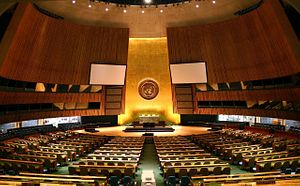Last week was supposed to be Pakistan’s moment at the United Nations General Assembly. Pakistani Prime Minister Nawaz Sharif had hoped that he would be able to corner India on Kashmir by highlighting the unrest in the valley.
He had long been preparing for this moment. From describing Kashmir as the “unfinished agenda” of the UN to writing to the five permanent members of the Security Council, from waiting for the day when Kashmir would become part of Pakistan to describing Kashmir as the main pillar of Pakistan’s foreign policy – Sharif and his government had done everything possible to bring Kashmir to the center-stage just before the annual session of the UN General Assembly.
But in the end, disappointment was all Sharif could get. In his last address to the UN General Assembly, Secretary-General Ban Ki-Moon made no mention of the Kashmir issue despite touching upon a range of global issues including the crisis in Syria, the Palestinian issue, the situation in Myanmar and Sri Lanka, and global refugee and migrant movements. Sharif had written two letters to the UN Secretary General asking him to intervene on the Kashmir issue.
What would have been even more galling for Pakistan was the lack of support for its high voltage drama from the United States. U.S. Secretary of State John Kerry, widely considered as sympathetic to Pakistani concerns, made it clear that the onus is on Pakistan “to prevent all terrorists from using Pakistani territory as safe havens.” The State Department added that it would like Pakistan “to take additional steps to deal with all of the terrorist threats that it faces on its own territory but also those groups that frankly, that seek refuge or safe refuge within Pakistan’s borders.”
That Pakistan has few friends left in the U.S. polity has also been underscored by the new bill, HR 6069 or the Pakistan State Sponsor of Terrorism Designation Act, which has been introduced in the U.S. Congress and is aimed at designating Pakistan as a state sponsor of terror. In a damning indictment of Pakistani shenanigans, Congressman Ted Poe from Texas highlighted that “not only is Pakistan an untrustworthy ally, Islamabad has also aided and abetted enemies of the United States for years. From harboring Osama bin Laden to its cozy relationship with the Haqqani network, there is more than enough evidence to determine whose side Pakistan is on in the War on Terror. And it’s not America’s.”
In the region itself, voices have grown to isolate Pakistan. The Afghan government has suggested that South Asian states should come together to boycott the SAARC summit in Islamabad over Pakistan’s role in “destabilizing” the neighborhood.
So in the end it was left to Nawaz Sharif to wage his lonely battle at the UN. And like the dutiful weak civilian administrator that he is, he talked to the Pakistani military chief, Raheel Sharif, to discuss what track to take in his UN bluster. Reiterating that Pakistan “fully supports Kashmir’s right to self-determination,” Sharif without any hint of irony suggested that his country “has been the principal victim of terrorism including that is supported, sponsored, financed from abroad.” He offered India to enter into sustained dialogue for peaceful resolution of all outstanding issues including Kashmir but predictably ended up blaming India for setting impossible prerequisites for bilateral talks. Sharif also demanded an independent inquiry into the alleged atrocities committed by Indian armed forces in the Valley.
It was all standard boilerplate stuff that no one will take seriously. Pakistan is an isolated state today, and some credit for this should go to Modi government’s proactive outreach to the international community. Greater credit for the current predicament of Pakistan should go to the Pakistani military, which remains a strategically myopic institution with the sole interest of preserving its privileges in the name of India bashing. Nawaz Sharif who was once the great hope of India, has now become a victim of his own past. He has no appetite to challenge the military against the backdrop of revelations that his family members own off-shore companies with unaccounted-for wealth.
Above all, whatever little sympathy Pakistan wanted to milk for its position on Kashmir was lost because of the recent Uri terror attacks. As pressure mounts on the Modi government to take action against Pakistan in response to Uri attacks, which killed 18 Indian soldiers and as New Delhi deliberates on a possible response, it should be clear that India is on a very strong wicket. Huffing and puffing from the Pakistani military is just bluster and it cannot hide the nervousness which pervades the Pakistani establishment. Diplomatically, the country is isolated and on the military front, Indian security forces have ratcheted up the pressure on the border. Difficult though it might seem, the Indian military recognizes the need to maintain escalation dominance as the two nations climb up the escalation ladder.
As the UN fiasco underscores, Pakistan is waging a losing battle against India. The challenge for Indian policymakers is to recognize this trend and not get swayed by hyperventilation that is so common in sections of the media. Indian diplomacy has done its job well and now Indian policymakers need to figure out how to use the instrumentality of force with the kind of effectiveness that will result in the desired outcome. Mature powers know when to hold back and when to strike hard. The Modi government has its task cut out.

































